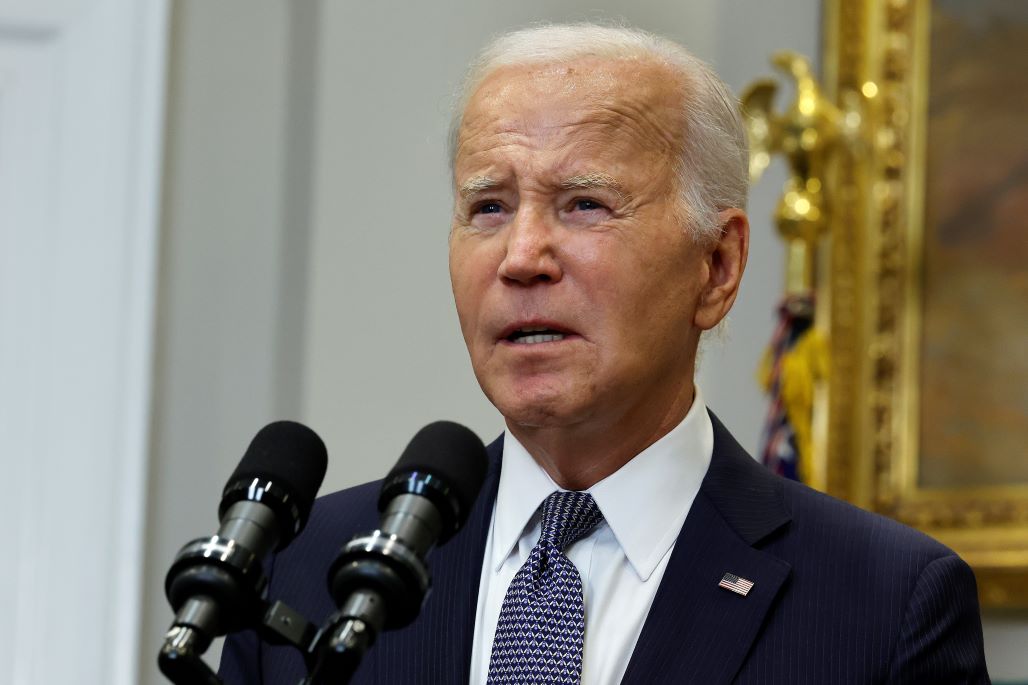Biden Is Wrong. The Supreme Court Is Already “Politicized.”
President Biden said he won’t expand the Supreme Court because doing so would “politicize” the court in an unhealthy way. But it’s a political institution by its nature — and a disturbingly undemocratic one.

President Joe Biden announces new actions to protect borrowers after the Supreme Court struck down his student loan forgiveness plan in the Roosevelt Room at the White House on June 30, 2023 in Washington, DC. (Chip Somodevilla / Getty Images)
After Thursday’s Supreme Court ruling against affirmative action, President Biden told reporters that this isn’t a “normal court.” Asked what he meant that night on MSNBC, he said that this court has “done more to unravel basic rights and basic decisions than any court in recent history.”
Fair enough. But when the most powerful officeholder in the United States says something like that, it’s reasonable to ask what he plans to do about it. And in this case the answer seems to be . . . nothing.
The cost of doing nothing is high. Whatever you make of the relationship between the version of affirmative action the court just struck down and the broader goal of achieving a more equal society, this was yet another sign of the aggressiveness of the court’s right-wing majority. On Friday, the Supreme Court ruled against Biden’s student debt relief plan.
During the MSNBC interview, Nicole Wallace asked Biden if he’d be willing to consider appointing additional justices to shift the court’s balance back in a more “normal” direction. He immediately ruled that out. “If we start the process of trying to expand the court,” Biden said, “we’re going to politicize it maybe forever in a way that is not healthy, that you can’t get back.”
The problem with this answer is that the Supreme Court has always been political. By its very nature, it’s a political institution — and a disturbingly undemocratic one.
The Supreme Court Versus Basic Rights
Attention-grabbing cases like the ones ruling against affirmative action, canceling student debt relief, and last year’s landmark overturning of Roe v. Wade are only the tip of the iceberg. Recent rulings whittling away at workers’ right to strike and weakening laws against corruption fly under the radar of casual news consumers but speak volumes about the ideological orientation of the court.
In some of these cases, the court is upholding laws. In others, they’re overturning them. But in all cases, the court is a powerful political actor. Two-thirds of the public, for example, told pollsters that they wanted Roe to stay in place. But the justices are free to disregard that supermajority.
Many people think that independence from public opinion is an unambiguously good thing. The official myth of the institution is that the justices are trying their level best to interpret the majestic ambiguities of the US Constitution in an ideologically neutral way. Anyone who believes that must think it’s an amazing coincidence that all six conservative justices signed onto Thursday’s ruling and thus effectively voted to enact a conservative policy preference (abolishing affirmative action) while all three liberals dissented. Even a casual glance at past rulings will uncover many, many such coincidences.
Why Not Pack the Court?
The obvious reality is that a constitutional lawyer who doesn’t know how to make a case for or against any of these rulings isn’t much of a constitutional lawyer. I’d note that, even in cases without the kind of strict partisan breakdown we saw in the affirmative action ruling, whichever justice or justices do dissent always come up with something to say.
Once we acknowledge that Santa and the Easter Bunny don’t exist and that justices of the US Supreme Court are political actors much like their counterparts in the other branches, the real question is why everyone should lie down and accept whatever rulings they make.
Nothing in the Constitution specifies a maximum number of justices. Congress could just decide tomorrow that twelve or fifteen is a better number than nine. President Franklin D. Roosevelt unsuccessfully proposed doing exactly that in 1937 — and while he couldn’t convince Congress to do it, his attempt may have rattled the court enough to change an important ruling. Owen Roberts had previously sided with the conservatives on the court in blocking New Deal legislation, but in the famous “switch in time that saved nine” he sided with the court’s liberals to uphold the constitutionality of minimum wage laws. Whether this switch was motivated by fear of court expansion is a historically controversial issue, but it’s at least plausible that the threat helped to nudge him in the right direction.
Biden’s stated reason for not following in FDR’s footsteps is that once the Supreme Court is “politicized” there’s no going back. If he isn’t seriously trying to suggest that the justices are ideologically neutral right now — that they’re all just earnestly trying to channel the spirits of the framers of the Constitution — then presumably it means that it’s a bad idea to openly acknowledge that the justices are political actors and unabashedly act to counteract their influence. But why not? Because Republicans will do the same? Fine. If both sides going forward are willing to throw their weight around to counteract overly aggressive court majorities, then the voters will have the ultimate say — which is how democracies are supposed to work. And if we never go back to a situation where we allow nine unelected lawyers trained at ruling-class universities like Harvard and Yale to act as a super-legislature that feels free to do whatever it wants, whenever it wants, that’s a good thing.
Joe Biden is comfortable with the status quo because, even if he’d prefer a more liberal ruling here and there, he’s a centrist who values the stability of the system more than any of the policy outcomes impacted by these rulings. Anyone who wants a substantially more just society than the one we’ve already got will have other priorities.